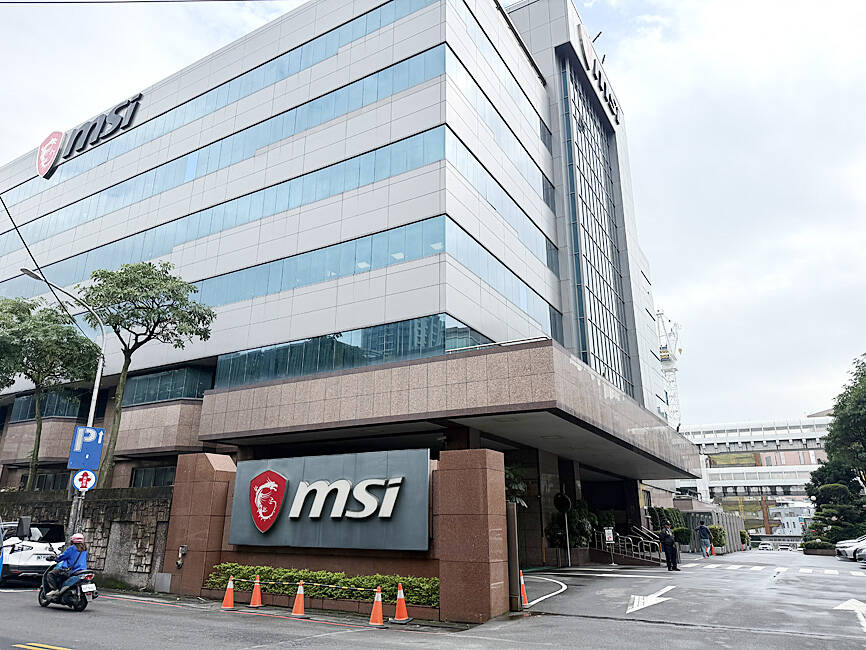GOING WEST:
MSI’s domestic rivals are pursuing similar North American strategies, opening factories in Mexico or expanding capacity in the US, the company said
-
By Meryl Kao / Staff reporter
Micro-Star International Co’s (MSI, 微星科技) US unit has acquired a commercial property in California for US$65.2 million as the computer hardware supplier considers operational needs, it said in a regulatory filing on Tuesday last week.
The company early last month told an earnings conference that it would soon announce plans for new production lines in the US in light of US President Donald Trump’s tariff policy.
Trump on April 2 announced the imposition of a 32 percent “reciprocal” tariff on Taiwanese goods, which he on April 9 postponed for 90 days.

Photo: CNA
MSI’s board of directors also agreed to inject US$33 million in new capital into MSI Computer Corp to expand the US unit’s operational scale, the filing said.
US revenue for the company, which produces laptops, graphics cards, motherboards and other computer components, accounted for 26 percent of its total revenue last year, compared with 37 percent for the Asia-Pacific region and another 37 percent generated from Europe, the Middle East and Africa combined, its earnings report showed.
“We have long considered plans to strengthen our production in the US subsidiary due to the continued tension caused by the US-China trade war. The decision today reflected our years-long evaluation,” an MSI spokesman told the Taipei Times by telephone.
The company also plans to adjust its overseas production deployment in response to Trump’s tariff policy, the spokesman said.
“Some of our main local rivals are adopting similar strategies, such as relocating factories to Mexico or expanding manufacturing in the US, as we are all striving for survival and better shipments,” he said.
MSI reported earnings per share of NT$8.04 for last year, compared with NT$8.92 a year earlier, as net profit dropped 9.82 percent year-on-year to NT$6.79 billion (US$208.23 million) from NT$7.53 billion.
Revenue last year rose 8.1 percent to NT$197.87 billion, from NT$182.97 billion a year earlier, while gross margin fell to 12.2 percent from 12.5 percent and operating margin decreased to 3.6 percent from 4.8 percent.
Sales of the company’s three major products — motherboards, graphics processing units and notebook computers — are expected to increase by double-digit percentages this year, MSI chairman Joseph Hsu (徐祥) told investors on March 14.
The company’s average selling prices for products and gross margin are also expected to rise following the launch of artificial intelligence (AI) PCs and graphics cards in the second half of this year, Hsu said.
MSI has moved some production lines from China to Taiwan since 2020 amid the US-China trade dispute during Trump’s first term.
The firm has factories in New Taipei City’s Jhonghe District (中和) and Taoyuan’s Gueishan District (龜山), and it last year purchased land in Taoyuan for a proposed new plant, which would focus on the research and development, and the manufacturing of high value-added products such as AI servers, AI of things applications and charging piles.
Construction of the new plant is scheduled to start this year and is to become operational in 2027, MSI said.
The company’s Taiwanese peers have made similar moves to expand US production capacity to avoid heavy tariffs imposed by the White House.
Wistron Corp (緯創) has set up a new US subsidiary, Wistron InfoComm (USA) Corp, and is preparing to acquire land and property in the US, the company said early this month.
Inventec Corp (英業達) has said it is on the lookout for a production site in Texas, while Quanta Computer Inc (廣達) said it continues to expand capacity at its server plants in California and Tennessee.

